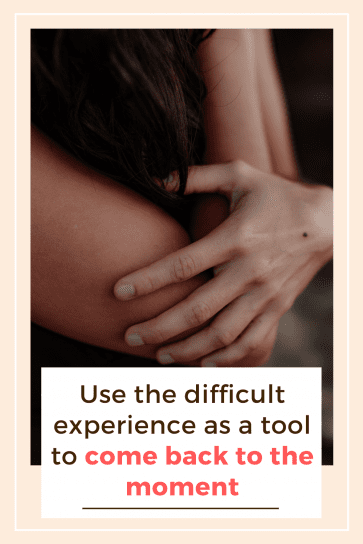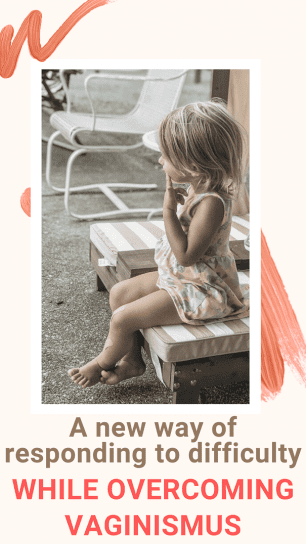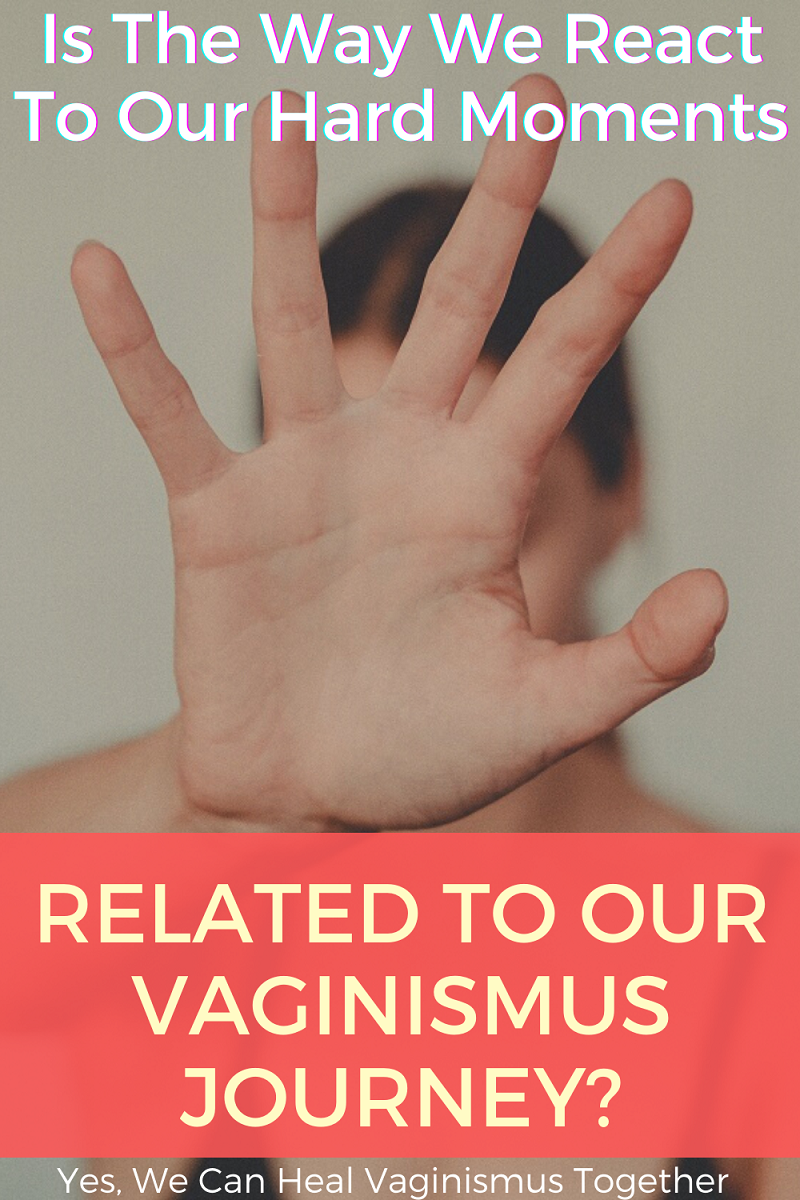My answer is to this question is YESSSS with the bold stars. 😊
Let me show you how they are connected so that you can decide how to transform these often unhealthy and reactive behaviors into healthier ones that won’t lead us into giving up, postponing, or ignoring our overcoming vaginismus process.
But before we get there, are you new here? Then you’ll have to check out these other helpful blogs that I’ve written to help you overcome your condition.
- How to Train and Rewire Our Minds For Happiness While Overcoming Our Vaginismus
- Why Challenging Ourselves Matters Especially While Overcoming Our Vaginismus
- How to Dilate On Our Own While We Can Not Even Look Down There
and of course, you should join our EXCLUSIVE Facebook Community “Yes We Can Cure Vaginismus Together” by clicking here!
Oh and, you can download here your FREE Vaginismus Cure Guide based on my personal experience and research!
Shall we continue, dear?
I’ll begin with an example from my life back in time from when I had vaginismus.
The main thing I remember about my vaginismus journey was how ignorant I was of vaginismus.
It cost me more than ten years, my lovely friend. TEN YEARS! I literally shut myself up and wouldn’t stay in any relationship with anyone I felt sexually attracted to.
The biggest reason for this was that I was not able to deal with difficult moments in these relationships, and I ended up:
- feeling like a failure,
- feeling unworthy,
- or questioning my whole life!
I kept reacting to difficult moments by always “breaking up”, “running away”, and “giving up”!
If I look at how I dealt with my vaginismus, it was not that much of a different story, dear.
So, let’s think of when we dilate.
During dilation, we encounter pain and start to feel frustrated.
Up until now, there was no problem, though, in that very moment, your experience felt like it had shifted.
You start to question the whole process of healing and end up asking: “Why do I need to do this?”, “Why do I have to dilate?”.
Eventually declaring: “Why do I even have to have sex! What and who for?”
Can you guess what happens next?
Well, just like anyone else in that space, you would stop dilating!
- Either you tell yourself that you’ll dilate another time, maybe tomorrow, and you believe it. We all know how our manipulative mind works! 😊
- Maybe you believe and convince yourself that this is not the method for you, which might be correct, although, the way you actively check in with the next step to overcome vaginismus matters most at that point.
- Or you might feel guilty but continue dilating inconsistently.
When we are unaware of the different aspects of vaginismus, we can end up living with the condition for years, eventually losing the sense of self-worth and the inner belief in ourselves that is necessary to overcome vaginismus.
So, in my earlier example, you will see what happens when we react to feeling frustrated.
When we go backward, we react to pain automatically.
How we end up here is not a coincidence, dear. It is a habit!
When we look at glimpses of our lives’ challenging moments, we’ll see a similar pattern of reacting to such difficult moments with habits that were formed while healing our vaginismus.
That’s why while working on transforming the habitualized behaviors that are not serving us, we transform our vaginismus experience into a learning and growing journey.
Here are three important notes that can lead us towards this transformation.
#1 Stop reacting immediately and start responding instead
Usually, we tend to react if we haven’t prepared to respond.
Let me clarify what the difference between a reaction and a response is:
A reaction comes as a first instinct; we act without thinking.
As Matt James says in his article:
“ When you say or do something “without thinking,” that’s the unconscious mind running the show.” (You can read the full article here)
Alternatively, a response comes with informed thinking; we act more mindfully. It’s a slower process when compared with “reaction”.
Think of the moments that you felt regret after what you said.
Most probably, those words came out of your mouth without thinking, right? It might have felt OK while saying them, but afterward, it did not feel right.
In those situations, I can tell that you reacted, and now, so can you.
On the other hand, if we can create a bit of space between whatever happens now and how we deal with it, our behavior becomes a “response”.
When we take a moment to respond, we can intentionally focus on our breath before acting, even if we have an urge to act in that moment. This doesn’t just refer to breathing alone it also calls for us to be very attentive to our breathing, taking the time to notice the breath’s movement in our body during inhalation and exhalation as best we can.
As we breathe, we not only create space between whatever happens at the moment; also, we regulate our nervous system so that we can feel that we are there at the moment and not caught somewhere in the imagination of our habitualised minds.
#2 Use the difficult experience as a tool to come back to the moment

It’s essential to keep in mind that whatever we experience throughout the day manifests in our bodies in some form.
We can see our vaginismus condition as proof of that. Our bodies contract at any penetration attempt; even thinking about it can impact our bodies as well.
When we look at this, it’s an amazing body-mind connection! It’s very impressive that we can transform this connection into a healthier one!
When we think about any challenging incident we face, when we create a space within it by breathing consciously, then we can choose to come back to our bodily sensations and manifest with the incident a bit easier. As we look at those sensations, we may notice many little details that we have never been aware of, such as contracting our shoulders, bellies, legs, hands, or other parts of our bodies.
The beauty here is that as we choose to explore these sensations at that moment, we learn a new way of responding to our difficult experiences instead of giving up, running away, or simply ignoring them.
#3 Learn a new way of responding to difficulty, especially while overcoming vaginismus

So, what happens when we notice our bodily sensations whenever we face any challenging situation is to relax and soften them as best we can.
To do that, we can consciously use our breath as a tool and imagine or visualize that our breath is reaching those tightened parts of the body and see if we can relax them. Try dropping the shoulders as we breathe out, for instance, or relaxing the belly, and see how we feel at the moment.
As you can see, we aren’t trying to distract ourselves with anything and change our state of mind as soon as possible but are rather exploring our challenging experience differently; without getting lost in the stories of our minds.
We learn to turn to them, explore them and stay with them.
What I’ve been sharing with you here is a skill, my lovely friend, which we can only learn as we practice. Mindfulness is one of the best ways to practice it and empower ourselves within any of our difficult experiences.
We face tonnes of pleasant, neutral, and unpleasant experiences throughout the day, dear. As we become more aware of them, we’ll have a chance to practice this skill in new ways.
The more we become mindful, the more we grow, dear.
All those challenging moments in our lives are our teachers to cultivate holistic and healthy habits that will help overcome our challenging condition, vaginismus.
Do you want to join me and more women like you in being grateful for every single difficulty and learning how to be aware of the tools we need to heal our condition so that overcoming vaginismus can be inevitable? Then CLICK HERE to join our community of women across the world who want to help you become the ultimate you.

Nothing ever goes away until it has taught us what we need to know. ”
Pema Chödrön
You can download my free vaginismus overcoming guide from here if you haven’t yet.
If you found this article helpful, then come and join our free online community Yes We Can Cure Vaginismus Together, if you haven’t yet.
I talk more about these topics and in more detail.
Let’s meet there. Let’s grow together.

E-mail: petek@yeswecancure.com
Related Blog Posts:
How to See My Crazy Thoughts Differently While Living with Vaginismus
How to Transform Our Relationship to Pain When Living With Vaginismus


